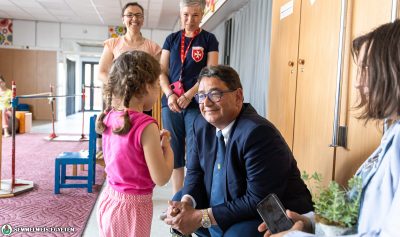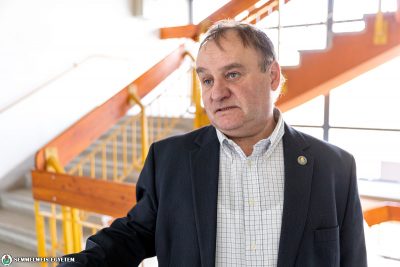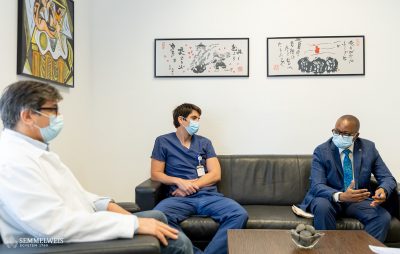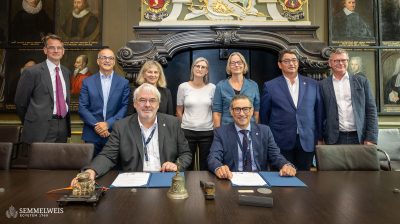PAK, with support of the Hungarian government, has been running a conductive development program in Berehove, Transcarpathia since 2014, with 262 participants so far. With the help of the local organisation of the Maltese Charity Service, the predominantly disabled children in need of development and their families were brought to the Berehove site of the program, where they attended an intensive three-week so-called interval education course, delivered by the faculty’s conductors four times a year. Due to the ongoing war in Unkraine, the program there had to be stopped, but PAK and its supporters arranged for the participants from across the border to continue the project in Budapest, in the faculty’s building on Kútvölgyi út.

“You can see the children are happy and smiling when participating in the program, because they feel that their lives are becoming more fulfilling thanks to the conductive education method,” Dr. Béla Merkely, Rector of Semmelweis University said, when he visited the families. “One of the primary tasks of the András Pető Faculty’s conductors is to help children born with cerebral palsy to develop so that they can live as independent life as possible,” the Rector said, pointing out that the Pető-method, which is a Hungarian heritage, is unique in the world. He emphasized that the development work of conductors is also extremely important for children and their families, so it has to be continued despite the war. “Just as in the past, during the coronavirus epidemic, so now, during the war, neither education nor medical treatment at Semmelweis University can stop,” he added.

The trip of families from abroad to Budapest is organized by the Johanniter International Assistance. Depending on availability and the number of places, 7-10 families will participate in each tour, staying in the renovated apartments of PAK and in rooms offered by the Danubius Hotel Budapest. Their meals will be provided by the faculty, the hotel, the Johanniter, Budapest Bike Maffia and Cityfood, but the Nursery School of the Pető András Faculty of Semmelweis University has also organised a collection for them”, said Dr. Miklósné Dr. Andrea Zsebe, Dean of the PAK. She added that seven families arrived in the first round at the end of March. “Intensive Interval Education is a special form of care in conductive pedagogy. It provides three weeks for the program, for which we have a whole school year in public education. The course begins with a condition assessment, during which the conductor observes and records what condition the participant is in and what abilities he or she has.
Based on this, she designs the program: she puts together the groups and what facilitation, tools and differentiation are needed, how they can work together. “In Berehove we work with children, but as well as developing them, we also teach the parents how to continue with their child when conductors are no longer there. We also teach them how they can do the exercises and solutions: how to apply them in their everyday life. This is a very intensive course, and we also have to take into account that other cultures have different educational methods, and in some countries parents have a different attitude towards children than in Hungary,” she explained. According to Dr. Miklósné Dr. Andrea Zsebe, it is important for families coming to Budapest to have the opportunity to relax in addition to the development work, so they organise theatre visits with their partners and supporters, they can attend church services on Sundays, and PAK students take the children to playgrounds.
“My three-year-old son and I are taking part in the course for the first time, we are very happy to have been included in the program. We both enjoy doing the tasks during the sessions” – said Bianka Nagy, who came to Budapest with her child from Csap, Berehovo district, in the first round. She added that after just a few days she can already see the progress her son is making and is confident that the three weeks will bring huge changes with the help of the conductors.

“By the end of 2021, we have worked with a total of 2,084 children and adults in our programmes across the Carpathian Basin with the help of 274 conductors. This means more than 4500 days, or more than 12 and a half years of development time. We receive excellent feedback from participants, and our courses are many times over-subscribed,” said Pál Csuka, Head of the PAK Center for Projects Beyond Borders. He added that the faculty has established an educational cooperation with the Ferenc Rákóczi II College in Berehove. The aim of the BA course in conducting is to enable the conductors who study there to stay in the region after graduation and help families interested in conductive development. “PAK, relying on the cooperation of donors and the support of the Hungarian government, would like to continue the Berehove project in Budapest as long as there is a need for it due to the Ukrainian war”, Pál Csuka underlined.
Edited by Ádám Szabó, translated by Rita Kónya
Photo: Attila Kovács – Semmelweis University


